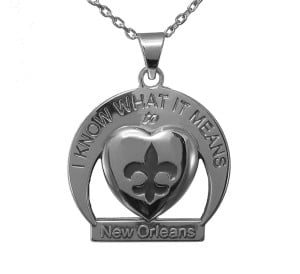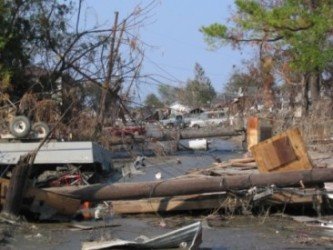Troops find families scattered, homes flooded
By Brian Thevenot
Staff writer
(New Orleans, Louisiana) Minutes before heading out on one of his last combat patrols in western Baghdad, in treacherous rural territory that had claimed the lives of 35 soldiers in Louisiana’s 256th Brigade Combat Team, Lt. William Besselman of New Orleans picked up a scrap of good news about Hurricane Katrina: It looked like the city had dodged a bullet. When he returned from patrol 12 hours later, fatigued but comforted in the hope that his family and his hometown remained unscathed, he and the rest of the brigade confronted
the grim reality. Levee breaks had inundated Chalmette and the 9th Ward with up to 20 feet of water – including his home at Jackson Barracks on the border between Orleans and St. Bernard parishes. The news only got worse; the 17th Street Canal levee breach flooded broad swaths of the city and strained law enforcement agencies lost control of the city.
 “I was always worried about me not coming home – never that my family could be in danger,” he said Monday as he toured his battered home inside the confines of Jackson Barracks, where New Orleans Guardsmen are stationed.
“I was always worried about me not coming home – never that my family could be in danger,” he said Monday as he toured his battered home inside the confines of Jackson Barracks, where New Orleans Guardsmen are stationed.
One of the first of the returning Louisiana soldiers to visit his home, Besselman relayed the story of angst over Katrina among soldiers already beaten down by a year of intense warfare marked by teary funerals for comrades. In Besselman’s 19-man platoon alone, one soldier had died and eight suffered injuries, almost all from roadside bombs.
Standing in the home, surrounded by moldy furniture under a roof ripped open by wind and water, Besselman remained upbeat, even as he trudged through the stinking wreckage of his bedroom and those of his children. On an ironing board with a rotting cover next to him sat precious documents he had tried to dry out: his marriage certificate, his children’s baptism certificates.
In Baghdad, upon hearing of the catastrophic flooding, Besselman had rushed to a computer to check his e-mail, finding a note from his wife saying that she and their four children had safely vacuated to a Gonzales hotel.
Over the next few days, as soldiers continued their combat missions, they alternated between worry about their families, helplessness in being away at war and, Besselman said, anger and embarrassment at the reports of looting and lawlessness. We wished we were there” to enforce order, he said. “We were embarrassed. They did that in our own city. They didn’t have to do that.” New Orleans Guardsman Brian McDow, in an e-mail from Alexandria where most of the troops are still stationed, said soldiers grew increasingly frantic as they watched news of the storm from abroad. “With each minute that passed, we gathered around the televisions … and we watched Katrina do her work,” he wrote. Word spread like wildfire when the levees broke, and we all wanted to know where and how bad the city was flooding … What came as a horror to us was all the criminal activity during and after the hurricane. We all wanted to go to New Orleans and treat these thugs like insurgents.” McDow and other soldiers of the Louisiana Guard’s 141st Field Artillery Battalion were taken out of Baghdad, via Kuwait, about a week after the storm hit. Besselman, who serves in the 156th battalion out of Lake Charles, left about the same time, on a flight out of Baghdad carrying about 130 soldiers who lived in New Orleans but served in battalions stationed in other areas of Louisiana.
Once back in Alexandria, the Guard released soldiers for four days to track down their families, McDow wrote. For many, that wasn’t enough, and the Guard granted them extensions. Upon returning home from Iraq, hundreds of Louisiana soldiers were unable to find their families for days, said Maj. Pat Simon, and some still have not. “Myself, I had to drive from Alexandria to Lake Charles to Dallas and then back to Alexandria,” McDow wrote. “I know some soldiers had to travel even farther to find their families.”
The future for McDow and his brother, fellow Louisiana Guardsman Mike McDow, remains uncertain. “I am … considering staying on active duty because I have no job or a home to go to,” McDow wrote. “My brother … was able to see his home on Saturday. He said it had 5 feet of water inside.
He will remodel, but doesn’t know if he’ll stay or sell.” As Besselman waited for about a week in Baghdad for a flight back home, a call from his wife, Stacie, desperately seeking help in finding her father, drove home the impact of the disaster. Besselman had a better chance of reaching her father from Iraq than his wife did from Gonzales. Besselman’s father-in-law, Guard Col. Lester Schmidt, had stayed at Jackson Barracks as the military compound was inundated with 10 to 20 feet of water. Once the levees broke, he and his son, Sgt. Lester Schmidt Jr., hopped in a boat and started rescuing people trapped on the roofs in the Lower 9th Ward and Chalmette. “We tried to reach her father for five to seven days,” he said.
Finally, Besselman got through to Louisiana Guard troops at the Superdome, who said they had heard his fatherin-law on the radio, confirming he was safe. Besellman’s dog, Rogue, had stayed behind at the flooded military base after most of its soldiers had been evacuated. “He lived on MREs for a week until the Georgia National Guard brought him some dog food,” Besselman said.
While Besselman struggled to get home, his wife went from Gonzales to Houston to Alexandria, where the couple now plans to stay and build a new life. As he surveyed the wreckage of his home, Besselman downplayed many hardships he might have endured, either at war or in the aftermath of Katrina. “My wife deserves all the credit,” he said. “She moved all the kids around, and put them all in new schools.
Source – Times-Picayune NOLA.com
 A Katrina relief badge, jewelry goes gold, will shortly become widely available, as jeweler Anne Dale has agreed to put a her New Orleans Jewelry creation into large-scale production.
A Katrina relief badge, jewelry goes gold, will shortly become widely available, as jeweler Anne Dale has agreed to put a her New Orleans Jewelry creation into large-scale production.
 (New Orleans, Louisiana) Ten days after Hurricane Katrina tore through the Gulf Coast, Anne Dale and her family sat in her Covington home with no power, no running water and a battery-operated TV, rigged with a coat hanger as an antenna.
(New Orleans, Louisiana) Ten days after Hurricane Katrina tore through the Gulf Coast, Anne Dale and her family sat in her Covington home with no power, no running water and a battery-operated TV, rigged with a coat hanger as an antenna.
 “I was always worried about me not coming home – never that my family could be in danger,” he said Monday as he toured his battered home inside the confines of Jackson Barracks, where New Orleans Guardsmen are stationed.
“I was always worried about me not coming home – never that my family could be in danger,” he said Monday as he toured his battered home inside the confines of Jackson Barracks, where New Orleans Guardsmen are stationed.